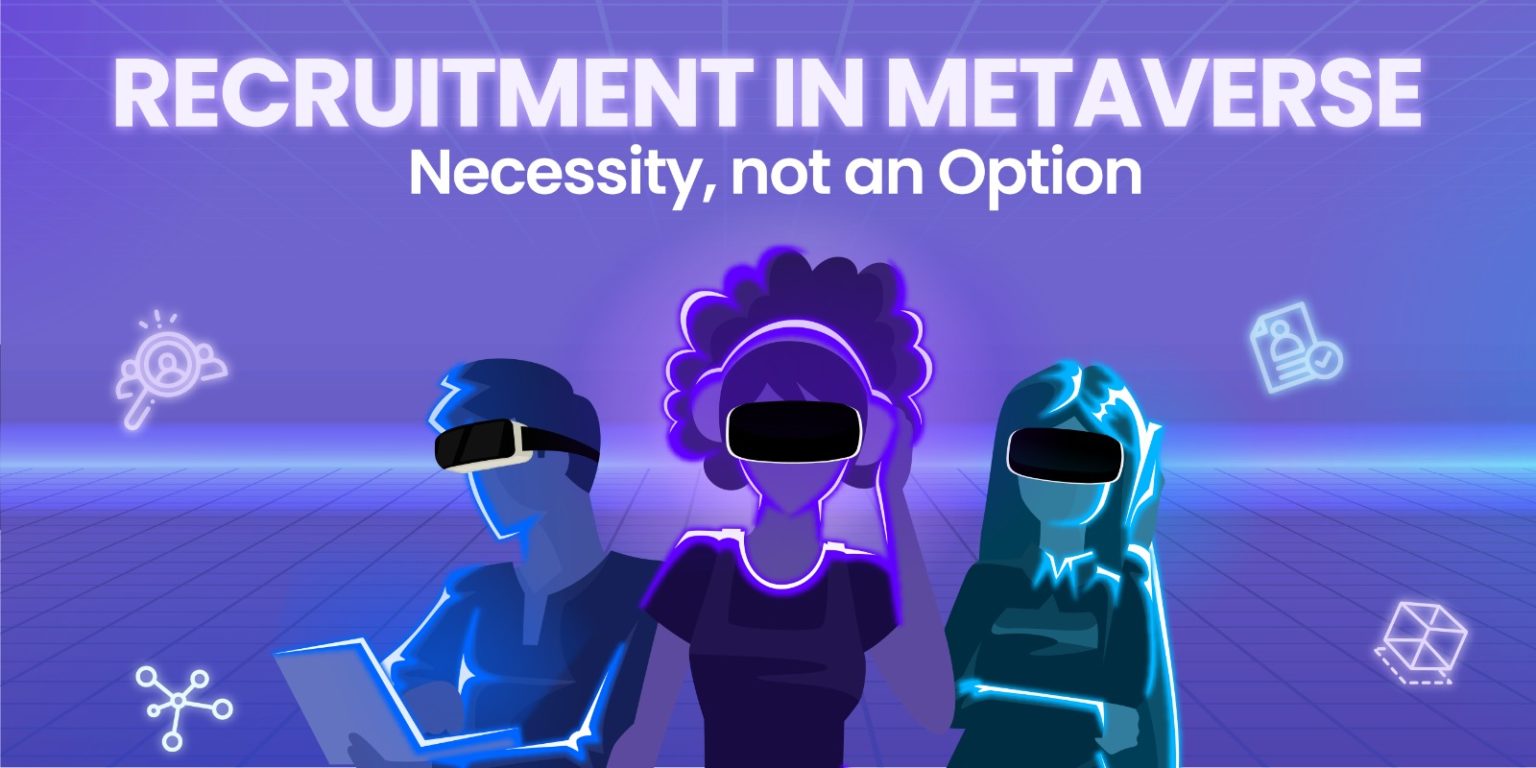It is essential for you as recruiters to be updated with the evolving nature of the workplace around the globe. The environment of workplace needs specific set of skills in its employees to perform according to the expectations. The future of the workplace is definitely going to be Metaverse and therefore you would need innovative ways to attract and recruit talent in that world.
Despite some organizations hesitating to embrace it due to uncertainty about its future impact, the Metaverse presents a unique and unparalleled opportunity to transform the hiring process. So, before delving into the intricacies of Metaverse recruitment, let’s first explore what the Metaverse is and which skills are going to be crucial for you to assess in candidates expected to work in Metaverse.
What is Metaverse?
Imagine you’re familiar with online gaming. You know how you can enter a virtual world, like Minecraft or Fortnite, where you can play with others and explore different environments, right? Now, think of Metaverse as a giant, interconnected online gaming world, but on a much larger scale.
In Metaverse, you can do all sorts of things, just like in real life. It’s like having a virtual version of the world where you can work, play, socialize, and more.
This term became popular when Mark Zuckerberg decided to rename Facebook as ‘Meta’. It also shows the importance of planning digital interaction for the future.
Metaverse in the beginning was conceived only as a gaming platform. Now even the big profile companies are taking it seriously. A few companies might take it as frightening and some think it is exhilarating. However, other companies have already begun to take it as an opportunity to engage with clients, employees, and customers. We’ll talk about them later.
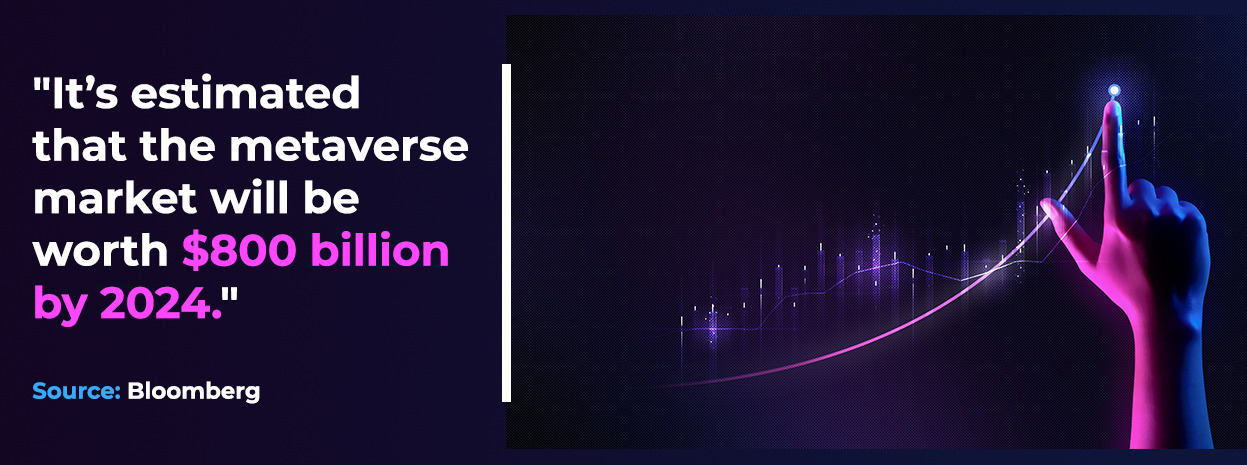
Impact of Metaverse on Workplaces
Metaverse incorporates the use of AR (augmented reality) and VR (virtual reality) along with spatial sound to provide employees an immersive experience. The workspaces are going to be completely transformed as the employees’ holograms and avatars are going to be interacting instead of real human beings. An employee can shift his workplace to anywhere and stay connected with colleagues. These are the following areas that will undergo immense transformation.
• Traditional Workplaces Replacing the VR Rooms
Metaverse will allow you to shape your own environment around you. Just like in traditional workplaces you listen to music to stay focused, in Metaverse you can completely transform your surroundings according to your preferences. Whether you want to work on a creative project or join a team for brainstorming, the digital elements will help you customize your surroundings according to the requirement of the task.
• VR and AR for Immersive Meetings
The greatest benefit of VR and AR (augmented Reality) is the ability to be together anytime anywhere with your team members. It is a game-changer for team collaborations and meetings. The screen meetings cause great fatigue.
According to a study by Stanford University, lack of access to body language and other non-verbal cues along with reduced mobility play a major factor in video call fatigue. The Metaverse features will not only help you be together with your colleagues but also it will contribute to overall collaboration and creativity.
• Remote Work at the Next Level
Remote work became a norm after the pandemic and it still continues which indicates that remote work or a hybrid model is going to stay. However, Metaverse offers further ease in working remotely as you don’t have to stick with just one system all the time.
The employee will have his virtual screens and keyboards and he can customize them in any way he wishes. There will be no physical weight to carry when you have virtual screens and boards. If you feel disturbed at one place, you can take all your setup to your favorite park and continue working without any hassle.
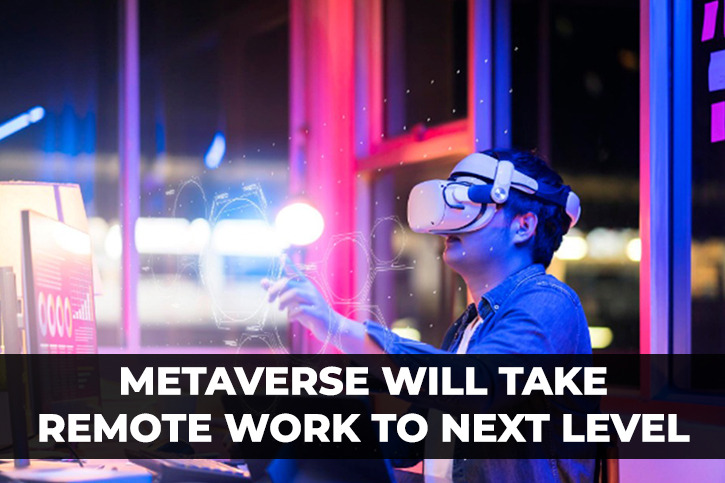
• Job training in Metaverse
Learning and development will become more than easy with Metaverse as the focus will shift from telling to showing. The best learning happens when we not only listen but also visualize in multidimensions.
The experts on the topic will also be available virtually from anywhere to remove any misunderstanding from the learners. This way the learners will get the chance to not observe, but also stand alongside and learn from the best instructors in their respective fields.
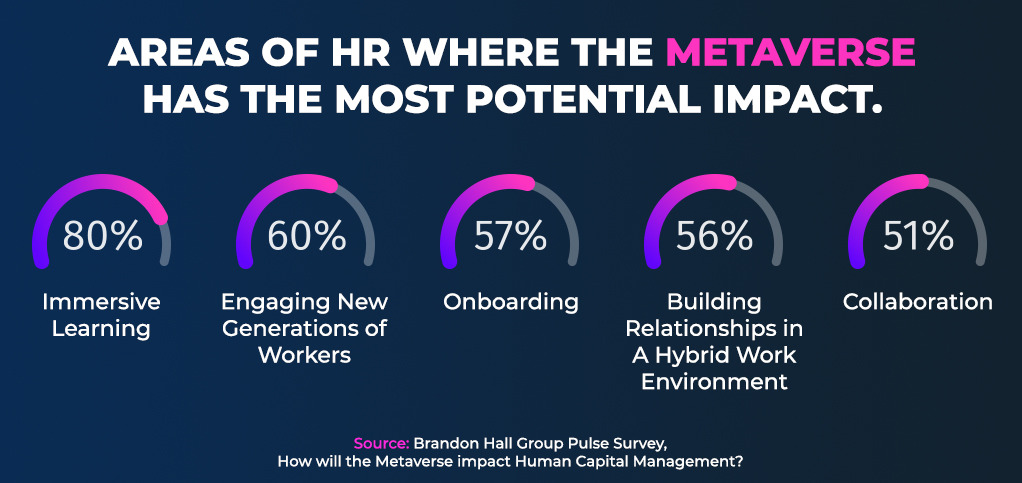
How HR will Transform in Metaverse
In the context of recruitment, the Metaverse for hiring talent could potentially be used as a platform for virtual job fairs or networking events, allowing job seekers and employers to connect and interact in a digital space. It could also potentially be used for virtual job interviews, allowing employers to evaluate candidates in a more immersive and interactive environment.
• Recruiting and Onboarding in Metaverse
Few big-profile companies have started recruitment in Metaverse to interview candidates and give them possibilities to meet people within the organization, improving the approach and the knowledge about culture, values, and opportunities they can get by virtual reality experience.
Virtuality enables them to reach a big and wider audience, transforming recruiting into a more accessible and easy way to find talent from different locations.
There are a few examples such high-profile companies like MGM which is using virtual reality to facilitate immersive onboarding processes for job seekers, and Globant which is getting into a 360° onboarding with virtual reality to welcome new hires. Moreover, Accenture got 60,000 Oculus (VR headsets) for recruitment in Metaverse.
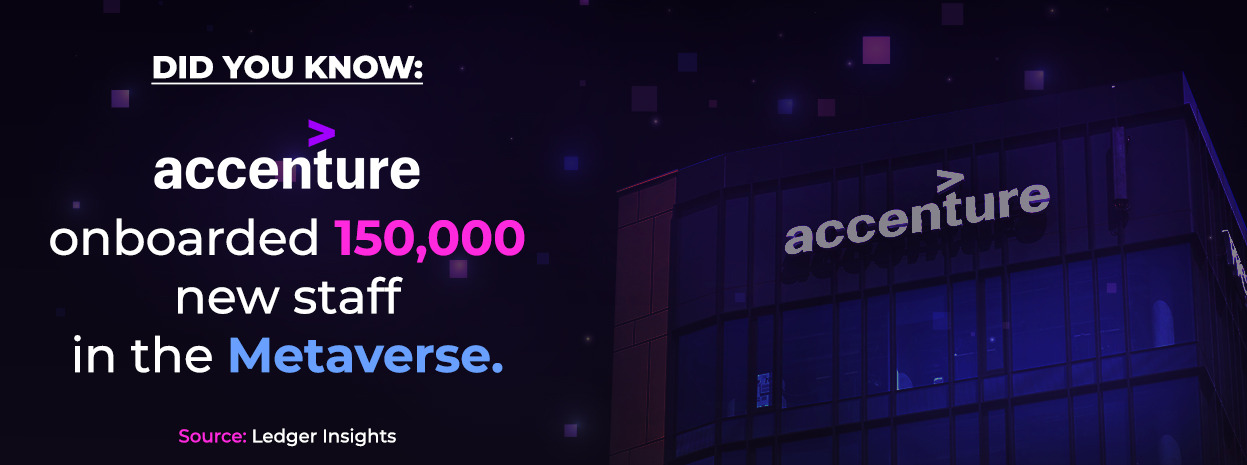
According to Martin Migoya, CEO of Globant, he said in his videocall with CNBC, “When you’re interviewing [people] on a screen, you don’t know a lot of things about them. But when you have the possibility to express many new things like you can express with your avatar in Metaverse, I think there will be a lot of opportunities to really understand people much better than before.”
• Interviews and Assessments in Metaverse
Tech companies have already launched software to execute virtual meetings like Mesh for MS Teams enhances 2D conventional videos with Virtual 3D rooms. This feature enables people to experience corporate office Metaverse with its virtual rooms during interviews and the whole building.
Through these initial versions, you can have interviews based on avatars, whereas, in the next stage of development, the real faces can also be used as holograms. Moreover, Meta has also come up with Horizon Workrooms as a virtual collaboration platform through Oculus Quest headsets.
As time pass by, the same idea can be extended to let candidates experience assessment centers, career fairs, and Hackathons in Metaverse where the candidates will have real-time interaction in a virtual world. For instance, Samsung has conducted a career fair through the Gather Town platform in Metaverse where the candidates interacted with the HRs and other hiring managers using avatars.
• Virtual Career Sites and Job Details
The Metaverse job descriptions will help the candidates experience how the job exactly looks like because the description will be based on a virtual walk-through of the actual place where the employee has to work.
Similarly, the whole 2d career sites of today will convert to Metaverse of career sites in upcoming years helping the candidates ‘experience’ the job description rather than just reading it. It will provide the companies an opportunity to enhance their brand as well.
Metaverse as the Ideal Workplace for Gen Z
Gen Z and millennials are going to occupy the workspaces by 75% and therefore it is essential to attract top talent. We know that most Gen Z spend time with gadgets, and the virtual environment will attract them. Therefore, Metaverse recruitment will be ideal for hiring the most talented candidates.
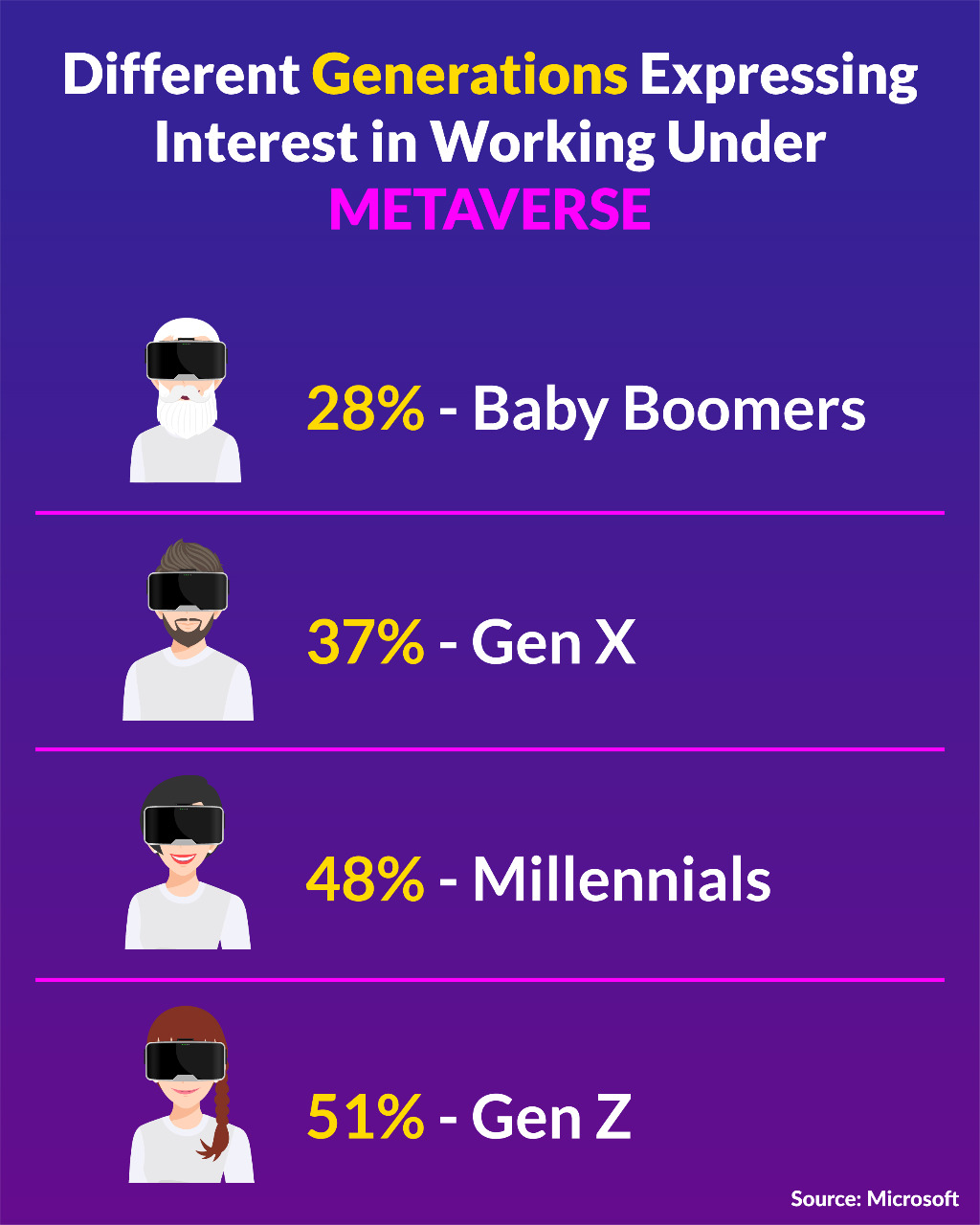
Few Possible Roadblocks to Embracing Metaverse
Web innovation is becoming trendy and employers waiting on the sideline for long will be left behind. Metaverse offers an immersive way of communication among people and employees who are working away from each other.
The importance of involving technology for hybrid workers is undeniable in every aspect ranging from talent acquisition to onboarding, training sessions, collaborations, meetings, marketing, and much more.
However, there are still the following roadblocks that may slow down the progress and adoption of the technology in workplaces and human capital management:
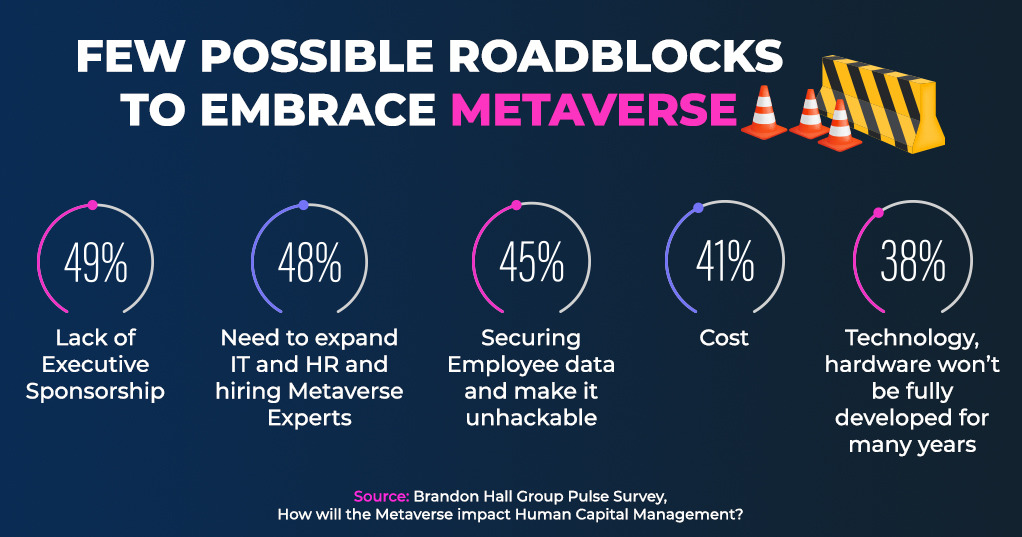
Nevertheless, the leaders forecast that Metaverse is the future of technology related to HCM and must be embraced. The recruitment departments should create a strategic plan because the benefits for all aspects of HR are too essential to let the roadblocks come in
Enter Metaverse Before It’s Too Late
Many brands are already making their way into Metaverse like Gucci and Nike. It is to take inspiration from them and catch the trend early to improve your employer brand and transform your workplace. These technological advancements are going to completely redefine the context of every organization and shape how it will function and create value for a long time to come. Those who stayed behind due to uncertainty will find themselves sooner or later operating in the world defined by others.
Metaverse is going to provide an immersive experience to the new candidates where they will experience the virtual world of their new workplace. The companies will have an opportunity to demonstrate their work culture to the candidates and help their recruiting teams to attract and increase the talent pool of the candidates through recruitment in Metaverse.
